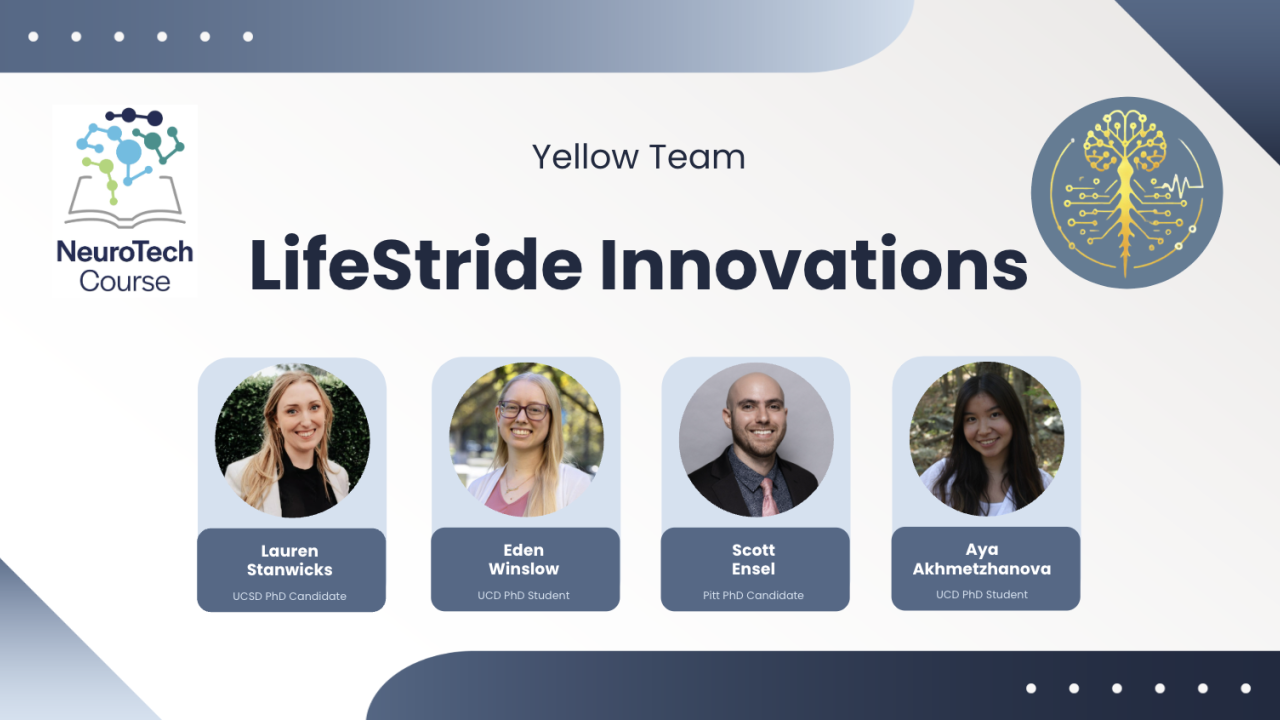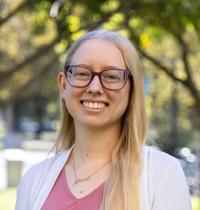
Learning the Fundamentals of Translating and Commercializating Neurotechnologies
The NeuroTech Course
Earlier this year, graduate students Eden Winslow and Aya Akhmetzhanova applied and were accepted to attend an annual virtual workshop, part of the NeuroTech Course. In this article, Eden and Aya share their thoughts about the experience.
The NeuroTech Course is designed to teach the fundamentals of translating and commercializing neurotechnology and is open to students, postdocs, and faculty. This educational program is freely available through support by the U.S. National Institutes of Health (NIH) and the Earl E. Bakken Medical Devices Center at University of Minnesota Medical School. The course directors and faculty hail from top universities, companies, venture capital firms, foundations, NIH, and are world experts in neurotechnologies.

Eden Winslow is a PhD student in the Biomedical Engineering Graduate Group, conducting neuroprosthetic control research in the Bionic Engineering and Assistive Robotics Laboratory (BEAR Lab) led by Dr. Jonathon Schofield. She is also a NeuralStorm Fellow, 2023 cohort.

Aya Akhmetzhanova is a PhD student in the Neuroscience Graduate Group. Her research project with Dr. Timothy Hanks and Dr. Rishidev Chaudhuri focuses on identifying latent behavioral and neural states underlying decision-making. Like Eden, Aya is a NeuralStorm Fellow, 2024 cohort.
- How did you find out about the course?
(Eden) Through the weekly emails from the NeuralStorm education program and the Center for Neuroengineering and Medicine (CNEAM).
- Was the application process complicated or extensive?
(Eden) It was not bad! The application process involved submitting a CV and short responses (<150 words) to three questions about my motivation for participating, an unmet clinical need I'm interested in, and a neurotechnology I'm interested in. I also did the self-guided online modules before applying.
- What was your motivation to attend?
(Eden) Mainly networking, since a lot of industry/researchers in fields I'm interested in were there. University of Minnesota has an excellent biotechnology program that I would love to be involved with!
(Aya) I had multiple motivations to take this course. First, the theme of neurotech is highly relevant to my research. Second, it allowed me to put myself out there and to connect with scientists from outside UC Davis and even outside academia, from different research areas. Third, I wanted to learn about how to take a product or technology to market. Last but not least, the time investment was modest, and it was easy to attend by Zoom.
- How much time did you put into it (curriculum, additional effort, etc)
(Eden) Other than the online modules which took a few hours over 2-3 days, I just spent the time within the course itself (2 days, 8:30am – 2pm), with no advance prep or follow-up.
- What did you find most useful about the program / curriculum?
(Eden) It was a good introduction into the 'research to product' pipeline. None of us were familiar with business or entrepreneurship, but the workshop was densely packed with good information that I can look back on later if I want to reference it. The faculty who worked with us were able to answer our questions well.
(Aya) I liked how the workshop was structured to include hands-on projects. We worked in small groups to propose an application to take from research to the market. It was good to get a bigger picture about how to advance a product. Every stage had guidelines that helped us through the projects while also learning about the industry. The exercises were very useful, involved a lot of discussion and learning. They allowed me to evaluate my own research in that context. In addition to the two of us, our group included advanced PhD students from University of Pittsburgh and UC San Diego. Other groups included students from University of Michigan, University of Minnesota, and more. The entire workshop cohort included around 30-35 students.
- How do you think that attending this course will help you in the future?
(Eden) I am more familiar now with the process that goes into building a start-up. I don't anticipate that being something I will do myself, but it's likely something I will be further exposed to in the biotech field. I also would love to leverage some of these connections in the future when I am looking for post-doc positions.
(Aya) I acquired new skills and learned lots of new things. Even though I’m not sure I will immerse myself in neurotech commercialization soon, the workshop was still helpful as I’ll apply what I learned to grant applications, reading about the regulatory process, and how to better write fellowship applications and publications. In addition, networking was really useful, and I got to connect with people doing interesting research, expanding my LinkedIn network.
- What was the most fun or most interesting thing about attending this course?
(Eden) I worked with a great group of other graduate students. Even though we weren't experienced with any of the topics, we were able to bring our interests together to form a solution to a need and build a company around it. I stayed engaged the whole time, and I thought it would feel longer than it did. There weren't any long lectures; it was extremely interactive and participatory, but I didn't feel like I was in over my head.
(Aya) I didn’t know what to expect at first: was it going to be very intense? Competitive? - It was not: the workshop was for learning and allowed exploration. I enjoyed having a group and working together as a team. We did not have cut-throat competition, quite the opposite: it was fun to discuss with other students, easy to do the hands-on exercises, and we were proud of the final presentation.
- Would you recommend this course to other students?
(Eden) Sure! Especially if you're interested in start-up/entrepreneurship. But even as someone who isn’t, it was still interesting and useful. I think getting a big-picture overview of concepts such as clinical trials, estimating market size, getting funding, and creating a venture pitch, is really valuable to understanding not just how to create a solution/product, but thinking about what makes it marketable and the barriers it will have to go through to get commercialized.
(Aya) This course is suitable for anyone interested in neurotech and/or commercialization, including undergraduate and graduate students. The length is just right, so it doesn’t take much time away from research.
- Was your PI supportive?
(Eden) He had no issue with me participating! He knows I’m interested in industry and supported me connecting with other experts. I worked from home for those two days and went back to research right after.
(Aya) Yes! I told my PIs that I applied for this workshop and that I got accepted. And they were very curious so they asked me questions about it: what did I expect, how was it like, what did I learn, what was the group project about. So they were very supportive, and they thought it was good that I took this opportunity and expanded my network at the same time.
The workshop made me think about the broader impact my research will have on the public (consumers, buyers), which is sometimes hard to ask yourself while you do the research. I was able to take a step back and think like a scientist as well as someone who is pitching a product. Students in our group had very different research topics, from spinal cord injury to prosthetics and to decision making, but we chose for our project something that we were all somewhat interested in, and it didn’t have to be connected to our research at all. It was nice to delve into something that you didn’t do on a regular basis. The faculty and mentors offered office hours, outside the group project, for people who wanted to tie back what they learned to their personal research questions.
Anyone interested in learning more about the NeuroTech courses and workshops, and/or enrolling in the self-guided course can visit this website. The program includes four modules: Process, Preclinical, Clinical, and Commercialization.
